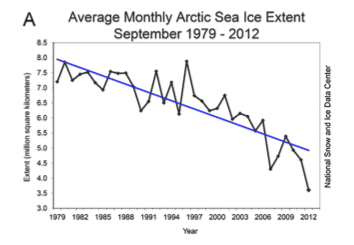Cetacean Species Affected by Warming Arctic
By Hannah Armstrong, RJD Intern
Global climate change, among other anthropogenic issues, is becoming an increasingly significant threat to the Arctic region of the world. Specifically, higher average temperatures and rapidly disappearing sea ice are of conservation concern for ice-dependent species. Arctic marine mammals are specifically adapted to take advantage of the climatic conditions that have prevailed in the Arctic for millions of years, and have been a target of conservation based on their role in the functioning of Arctic ecosystems and surrounding communities. Despite these conservation concerns, with impacts of climate change likely to worsen in coming decades, there is increased industrial interest in Arctic areas previously covered by ice.

A graph showing the evident decline in average monthly arctic sea ice extent from September 1979 through 2012 (Reeves et al).
In a recent study, scientists observed and mapped the distribution and movement patterns of three ice-associated cetacean (marine mammal) species that reside year-round in the Arctic: the Narwhal (Monodon monceros), Beluga (white whale, Delphinapterus leucas), and Bowhead Whale (Balaena mysticetus) (Reeves et al. 2013). Then they used these ranges and compared them to current and future activity sites related to oil and gas deposits, exploration, development and commercial shipping routes, to assess areas of overlap, as a means of highlighting areas in the Arctic that might be of conservation concern. Some of the results indicated the sensitivity of Bowhead whales to industrial activity; the sensitivity of Narwhals to climate change and noise, as well as a shift in distribution due to ice conditions; and the sensitivity of Beluga whales to noise, as well as a wider distribution extending into the sub arctic (Reeves et al. 2013). These observations ultimately triggered the need for a better understanding of the implications of environmental changes in the Arctic for cetacean species, in order to develop effective conservation and management policies (Reeves et al. 2013).
Poorly documented shipping routes and operations, in addition to accelerating Artic pressures in Arctic Norway, Arctic Russia, the Alaskan Arctic, Arctic Canada and Arctic Greenland, indicate that immediate measures need to be taken to mitigate the impacts of human activities on these Arctic whales, as well as the people who depend on them (Reeves et al. 2013). As indicated by researchers, some of these measures include: careful planning of ship traffic lanes (re-routing if necessary) and ship speed restrictions; temporal or spatial closures of specified areas (e.g. where critical processes for whales such as calving, calf rearing, resting, or intense feeding take place) to specific types of industrial activity; strict regulation of seismic surveys and other sources of loud underwater noise; and close and sustained monitoring of whale populations in order to track their responses to environmental disturbance (Reeves et al. 2013).
After comparing maps of Arctic whale ranges with maps of recent and anticipated oil and gas activity and shipping traffic in the Arctic, researchers noticed the unquestionable overlap between Arctic whales and harmful human activities. Based on unparalleled current and predicted rates of climate change, the futures of these three Arctic whale species are uncertain. Based on the significance of these species, both culturally and for proper functioning of the Arctic ecosystem, well-informed management decisions related to human activities will be imperative going forward.
Reference:
Reeves et al. Distribution of endemic cetaceans in relation to hydrocarbon development and commercial shipping in a warming Arctic. Marine Policy 44 (2014).
“Narwhals Breach.” WikiMedia Commons. WikiMedia, 1 Oct. 2012. Web. 29 Jan. 2014.




Leave a Reply
Want to join the discussion?Feel free to contribute!